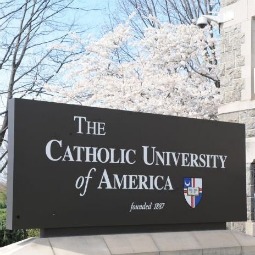Benedict on Education
Book review of A Reason Open to God by Pope Benedict XVI.

A REASON OPEN TO GOD
On Universities, Education and Culture
By Pope Benedict XVI
The Catholic University of America Press, 2013
336 pages, $24.95
To order: cuapress.cua.edu
What a Catholic university’s mission should be is an oft-debated topic.
All three of our most recent popes, from Blessed John Paul II to Francis, have had extensive experience in higher Catholic education as professors. Indeed, John Paul may well be considered the finest philosopher in the history of the papacy, and Pope Benedict XVI certainly ranks high as a theologian, particularly in his work of the ongoing rediscovery of the Fathers of the Church. In one way or another, we could refer to them as "university men."
The Catholic University of America Press has done us a great service by publishing A Reason Open to God, with Pope Benedict’s teachings during his pontificate. The book has a foreword by the president of Catholic University, John Garvey.
This collection is of particular value to Catholic Americans, as one of our finest boasts was that we had by far the largest collection of Catholic universities in the world, at least through the decade of the tumultuous ’60s. The majority of these universities were staffed by thriving religious congregations, both male and female. Then, out of the blue, a revolution took place in 1967 that changed Catholic higher education radically, but we hope not forever. It was known as the Land O’ Lakes Conference, for that is where a group of Catholic college presidents and academics undertook a revolution in Catholic education that hopefully will someday (soon) be rolled back.
The Land O’ Lakes document said: "To perform its teaching and research functions effectively, the Catholic university must have a true autonomy and academic freedom in the face of authority of whatever kind, lay or clerical, external to the academic community itself."
Now compare this with Pope Benedict’s address to Catholic educators at Catholic University in Washington on April 17, 2008: "It is the case that any appeal to the principle of academic freedom to justify positions that contradict the faith and the teaching of the Church would obstruct or even betray the university’s freedom and identity and mission: a mission at the heart of the Church’s munus docendi [teaching function] and not somehow autonomous or independent of it."
I found most interesting Benedict’s talks in England, on the occasion of his trip to beatify Blessed John Henry Newman, with whom Pope Benedict had a special relationship as a fellow theologian.
In his homily, Pope Benedict used Blessed John Henry’s own words to describe the goal of Catholic university professors: "I want a laity, not arrogant, not rash in speech, not disputatious — but men who know their religion, who enter into it, who know just where they stand, who know what they hold and what they do not, who know their creed so well that they can give an account of it, who know so much of history that they can defend it."
Opus Dei Father C.J. McCloskey is a Church historian and research fellow
at the Faith and Reason Institute in Washington.
- Keywords:
- July 14-27, 2013

















